
I was a staff writer for City Pages, Minneapolis' award winning alternative news weekly, from 2008 to 2009. I published cover stories, lifestyle features, news and blogs for 50,000+ readers. In 2009, three of my articles were awarded first place for short form news writing by the Association of Alternative Newsweeklies.

Animal activists target puppy mills across the state: Attempts at state regulation fail, so activists try something new
By Beth Walton
City Pages
Published: Jan. 14, 2009
For over 25 years, Twin Cities veterinarian Linda Wolf has been summoned to rural northern Minnesota to investigate cases of animal cruelty. She has gone to farms tucked back in the woods with hundreds if not thousands of dogs stacked in wire cages, high like a tower of blocks.
Federal regulations require only that the animal pens be six inches longer than the measure from a dog's nose to the start of its tail. Basically, that's the equivalent of a German Sheppard living in a cage the size of a bathtub. ...Click here for the full article text.
By Beth Walton
City Pages
Published: Jan. 14, 2009
For over 25 years, Twin Cities veterinarian Linda Wolf has been summoned to rural northern Minnesota to investigate cases of animal cruelty. She has gone to farms tucked back in the woods with hundreds if not thousands of dogs stacked in wire cages, high like a tower of blocks.
Federal regulations require only that the animal pens be six inches longer than the measure from a dog's nose to the start of its tail. Basically, that's the equivalent of a German Sheppard living in a cage the size of a bathtub. ...Click here for the full article text.

St. Paul deploys effective weapon against frisky felines: Is the reign of feral cats over in the Twin Cities?
By Beth Walton
City Pages
Published: Dec. 17, 2008
Roland Weber loves animals. So in 2006, when a big tomcat jumped on the outside windowsill of his brick duplex in northwest St. Paul, he couldn't resist giving the cat some food. He named the cat Mooch; all it wanted was something to eat. Only rarely could Weber pet him—the wild ball of fur never sat still enough to cuddle.
Mooch was feral, a lone cat roaming the streets just north of the capitol—until the Webers got a new neighbor who brought with them a female cat. Soon enough, Mooch was a father. His new cat girlfriend had gotten pregnant and kicked out of her home.
Within months, a family of five felines was waiting on Weber's porch. They'd show up in the middle of the night, crying and howling for food and water. They didn't like humans. As soon as you'd open the door, they'd scatter in fear. "The family just grew and grew," says Weber, who planned to get the kittens neutered when they were old enough.
Apparently, he waited too long. Within a year, Mooch had become a grandfather of three. ... Click here for the full article text.
By Beth Walton
City Pages
Published: Dec. 17, 2008
Roland Weber loves animals. So in 2006, when a big tomcat jumped on the outside windowsill of his brick duplex in northwest St. Paul, he couldn't resist giving the cat some food. He named the cat Mooch; all it wanted was something to eat. Only rarely could Weber pet him—the wild ball of fur never sat still enough to cuddle.
Mooch was feral, a lone cat roaming the streets just north of the capitol—until the Webers got a new neighbor who brought with them a female cat. Soon enough, Mooch was a father. His new cat girlfriend had gotten pregnant and kicked out of her home.
Within months, a family of five felines was waiting on Weber's porch. They'd show up in the middle of the night, crying and howling for food and water. They didn't like humans. As soon as you'd open the door, they'd scatter in fear. "The family just grew and grew," says Weber, who planned to get the kittens neutered when they were old enough.
Apparently, he waited too long. Within a year, Mooch had become a grandfather of three. ... Click here for the full article text.
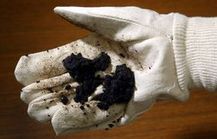
Midwest oil mining a crude idea to many : Are we now scraping the bottom of the barrel?
By Beth Walton
City Pages
Published: Dec. 3, 2008
Some 1,500 miles northwest of Minneapolis, the luscious green boreal forests that once lined the banks of the Athabasca River have been flattened. All that's left is an empty, lonely, gray moonscape. That, and the drills.
The machines push deep into the earth, farther than they ever have before, in order to extract a thick black syrup that sticks together with the sand and dirt to form a tar-like gritty dough. This is a dense and viscous form of petroleum called bitumen. It's oil, and the U.S. wants it.
A web of pipelines has sprouted up throughout the Midwest, following the Great Lakes, moving all the way from the Dakotas to Chicago and Detroit. The Canadians have stumbled upon an estimated 1.75 trillion barrels of crude, arguably the second-largest usable oil reserve in the world. ...Click here for the full article text.
By Beth Walton
City Pages
Published: Dec. 3, 2008
Some 1,500 miles northwest of Minneapolis, the luscious green boreal forests that once lined the banks of the Athabasca River have been flattened. All that's left is an empty, lonely, gray moonscape. That, and the drills.
The machines push deep into the earth, farther than they ever have before, in order to extract a thick black syrup that sticks together with the sand and dirt to form a tar-like gritty dough. This is a dense and viscous form of petroleum called bitumen. It's oil, and the U.S. wants it.
A web of pipelines has sprouted up throughout the Midwest, following the Great Lakes, moving all the way from the Dakotas to Chicago and Detroit. The Canadians have stumbled upon an estimated 1.75 trillion barrels of crude, arguably the second-largest usable oil reserve in the world. ...Click here for the full article text.
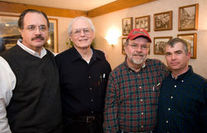
Local couples fight for gay rights in wake of Proposition 8: GLBT community continues to stare down obstacle
By Beth Walton
City Pages
Published: Nov. 26, 2008
Doug Benson and Duane Gajewski are marriage junkies. Like many gay couples, they have multiple anniversaries. Since they met in the 1990s—Doug was vacuuming at the DFL office in Duluth where he worked and Duane mistook him for a janitor—they have attempted marriage five times. In 1993 the couple was rejected for a marriage license in St. Louis County. In 2000 they traveled to Vermont for a civil union. Three years later they went to Thunder Bay, Canada, for a quaint, legal ceremony. Their last stop was in 2004 in San Francisco after Mayor Gavin Newsom issued a directive to the city clerk to issue marriage licenses to same-sex couples, claiming that the California Constitution's equal-protection clause gave him authority to do so.
For the first time, the couple had a marriage recognized, albeit temporarily, by some form of the American government.
"That was the best Valentine's Day ever," says Benson, 54, his smile peeking out from a thick brown beard. Click here for the full article text.
By Beth Walton
City Pages
Published: Nov. 26, 2008
Doug Benson and Duane Gajewski are marriage junkies. Like many gay couples, they have multiple anniversaries. Since they met in the 1990s—Doug was vacuuming at the DFL office in Duluth where he worked and Duane mistook him for a janitor—they have attempted marriage five times. In 1993 the couple was rejected for a marriage license in St. Louis County. In 2000 they traveled to Vermont for a civil union. Three years later they went to Thunder Bay, Canada, for a quaint, legal ceremony. Their last stop was in 2004 in San Francisco after Mayor Gavin Newsom issued a directive to the city clerk to issue marriage licenses to same-sex couples, claiming that the California Constitution's equal-protection clause gave him authority to do so.
For the first time, the couple had a marriage recognized, albeit temporarily, by some form of the American government.
"That was the best Valentine's Day ever," says Benson, 54, his smile peeking out from a thick brown beard. Click here for the full article text.

The Green Institute faces possible foreclosure after 15 years: It was ahead of its time, but now the nonprofit has a looming debt problem
By Beth Walton
City Pages
Published: Nov. 19, 2008
Annie Young went to bed exhausted. For more than 12 years, the large, outspoken woman had been rallying the troops in Minneapolis's poorest neighborhood, fighting a proposed county garbage-transfer station. Residents didn't need more heavy truck traffic, toxic fumes, and pollution. Phillips was already a "dumping ground," and the neighborhood didn't want anybody else's trash.
It was environmental racism at its worst, remembers Young, now a park commissioner. The early 1990s had brought a flood of new blood to Phillips. African Americans, Hmong, Somalis, and Latinos crowded the streets that already housed the city's main Native American population. The median income was around $12,000 a year. More than 60 percent of women and 40 percent of men were unemployed.
People were sick, Young says, her voice reverberating like a preacher's in the nearly empty conference room where she sits. There was lead. There was diabetes. There was cancer. Parts of the neighborhood were called "Arsenic Triangle," and years later the Environmental Protection Agency sanctioned the nickname, confirming high levels of poison in the soil at the east end.
"We were surrounded by pollution," she says. "We had so much pollution and so many sick people that a garbage-transfer station wasn't what we needed." ...Click here for the full article text.
By Beth Walton
City Pages
Published: Nov. 19, 2008
Annie Young went to bed exhausted. For more than 12 years, the large, outspoken woman had been rallying the troops in Minneapolis's poorest neighborhood, fighting a proposed county garbage-transfer station. Residents didn't need more heavy truck traffic, toxic fumes, and pollution. Phillips was already a "dumping ground," and the neighborhood didn't want anybody else's trash.
It was environmental racism at its worst, remembers Young, now a park commissioner. The early 1990s had brought a flood of new blood to Phillips. African Americans, Hmong, Somalis, and Latinos crowded the streets that already housed the city's main Native American population. The median income was around $12,000 a year. More than 60 percent of women and 40 percent of men were unemployed.
People were sick, Young says, her voice reverberating like a preacher's in the nearly empty conference room where she sits. There was lead. There was diabetes. There was cancer. Parts of the neighborhood were called "Arsenic Triangle," and years later the Environmental Protection Agency sanctioned the nickname, confirming high levels of poison in the soil at the east end.
"We were surrounded by pollution," she says. "We had so much pollution and so many sick people that a garbage-transfer station wasn't what we needed." ...Click here for the full article text.

Dan Griffith fights for your right to elect judges: Lawyer seeks to uphold state constitution
By Beth Walton
City Pages
Published: Oct. 29, 2008
Dan Griffith is not the sort of candidate to run on his experience. He barely mentions his 15 years as a lawyer, the time he spent as assistant city and county attorney in the International Falls area or that he received the Advocacy Achievement Award from Legal Services for his work with the disadvantaged—all of which would seem to be important qualifications in his bid for one of two statewide openings on the Court of Appeals.
No, what Griffith wants to talk about is the state constitution. Specifically, article VI, section 7, which says that judges "shall be elected by the voters from the area which they are to serve."
"Judges probably have more impact on our individual rights and freedoms than any other public office holder," Griffith says. "I don't think people realize it, but there is a very organized effort in this state to take away your right to vote for judges." ...Click here for the full article text.
By Beth Walton
City Pages
Published: Oct. 29, 2008
Dan Griffith is not the sort of candidate to run on his experience. He barely mentions his 15 years as a lawyer, the time he spent as assistant city and county attorney in the International Falls area or that he received the Advocacy Achievement Award from Legal Services for his work with the disadvantaged—all of which would seem to be important qualifications in his bid for one of two statewide openings on the Court of Appeals.
No, what Griffith wants to talk about is the state constitution. Specifically, article VI, section 7, which says that judges "shall be elected by the voters from the area which they are to serve."
"Judges probably have more impact on our individual rights and freedoms than any other public office holder," Griffith says. "I don't think people realize it, but there is a very organized effort in this state to take away your right to vote for judges." ...Click here for the full article text.

Holly Ann Collins faces new custody dispute: After returning from 14 years of hiding in Amsterdam and resolving her kidnapping case, the expat mother faces a new legal challenge
By Beth Walton
City Pages
Published: Oct. 15, 2008
Just a few weeks after Holly Collins returned to the Netherlands, thinking that she would never have to set foot in Minnesota again, her son, nicknamed "Chip," opened the door of their small home in western Holland and was served legal papers.
Collins's voice shakes as she translates the document from Dutch to English over the phone. According to the Order for Enforcement, the 15-year-old and his mother are to appear in Hennepin County Judge Charles A. Porter's courtroom today for yet another hearing. After more than a decade of having no contact with him, Chip's father, Jeff Imm of Zimmerman, wants the boy back....Click here for the full article text.
By Beth Walton
City Pages
Published: Oct. 15, 2008
Just a few weeks after Holly Collins returned to the Netherlands, thinking that she would never have to set foot in Minnesota again, her son, nicknamed "Chip," opened the door of their small home in western Holland and was served legal papers.
Collins's voice shakes as she translates the document from Dutch to English over the phone. According to the Order for Enforcement, the 15-year-old and his mother are to appear in Hennepin County Judge Charles A. Porter's courtroom today for yet another hearing. After more than a decade of having no contact with him, Chip's father, Jeff Imm of Zimmerman, wants the boy back....Click here for the full article text.

Skate or die: Life with the MN Roller Girls: The rough-and-tumble Roller Girls punch, smack, and kick their way to victory at the rink
By Beth Walton
City Pages
Published: Oct. 8, 2008
Before we get too far ahead of ourselves, there's something you need to know about me: I'm a klutz.
I'm about as athletic as a wall. I stumbled into writing after being cut from the softball, volleyball, basketball, swimming, and cheerleading teams all in the same year. I have been known to trip over my own feet and occasionally walk into glass doors. The last time I roller skated was in junior high.
But I'm obsessed with the Minnesota Roller Girls. If I were a lesbian, I'd want to date one. They have fun, bold names like Dixxxie Wrect (say it out loud), a killer fashion sense, and they're scrappy—they don't mind getting down and dirty now and again. Click here for the full article text.
By Beth Walton
City Pages
Published: Oct. 8, 2008
Before we get too far ahead of ourselves, there's something you need to know about me: I'm a klutz.
I'm about as athletic as a wall. I stumbled into writing after being cut from the softball, volleyball, basketball, swimming, and cheerleading teams all in the same year. I have been known to trip over my own feet and occasionally walk into glass doors. The last time I roller skated was in junior high.
But I'm obsessed with the Minnesota Roller Girls. If I were a lesbian, I'd want to date one. They have fun, bold names like Dixxxie Wrect (say it out loud), a killer fashion sense, and they're scrappy—they don't mind getting down and dirty now and again. Click here for the full article text.
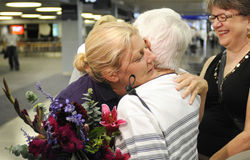
Holly Collins returns after 14 years in hiding: The battered woman fled to Amsterdam with her children in defiance of a court order
By Beth Walton
City Pages
Published: Sept. 24, 2008
Last Sunday, Holly Ann Collins walked off a plane and stood on Minnesota ground for the first time in 14 years. Her friends cheered, waving signs in celebration. "Holly, a champion for children," one read. Another said, "Welcome home."
"It's not a nightmare anymore," said a friend as she held Collins's hand. "You're back. This is the real thing."
Collins slowly surveyed the crowd who had come to greet her. One by one she recalled the people from her past. There was John, the boy she used to babysit when he was four years old. "He was just this high," Collins said, looking the young man over. Tears rolled down her face as she made her way through the group. "I can't believe it. Look at all you." ...Click here for the full article text.
By Beth Walton
City Pages
Published: Sept. 24, 2008
Last Sunday, Holly Ann Collins walked off a plane and stood on Minnesota ground for the first time in 14 years. Her friends cheered, waving signs in celebration. "Holly, a champion for children," one read. Another said, "Welcome home."
"It's not a nightmare anymore," said a friend as she held Collins's hand. "You're back. This is the real thing."
Collins slowly surveyed the crowd who had come to greet her. One by one she recalled the people from her past. There was John, the boy she used to babysit when he was four years old. "He was just this high," Collins said, looking the young man over. Tears rolled down her face as she made her way through the group. "I can't believe it. Look at all you." ...Click here for the full article text.

Minnesota's largest shelter killed more than 14,000 animals last year. How many were unnecessary?Animal welfare advocates say the shelter could dramatically reduce euthanasia rates
By Beth Walton
City Pages
Published: Aug. 20, 2008
When Amber was a little girl she would save her allowance to buy cat food for the strays roaming her neighborhood behind the Animal Humane Society's St. Paul location, a place still plagued by feral cats today. As a child, Amber made friends with the cats, begging neighbors and friends to take them in. Every once in a while she would go inside the shelter to watch the dogs in their cages. "I loved the dogs," says Amber, who is now a 28-year-old kindergarten teacher.
When Amber was in college at Concordia University, she and a friend decided to volunteer at the humane society. When she first started, the shelter was full "to the point where [we] would be there for four- or five-hour chunks, trying to get all the dogs adopted. It was a really great place. They were doing a lot," she says.
Then things started to change. Slowly it seemed as though dogs started to disappear. "Groups of them would be gone, and I thought, 'Wait a minute, this doesn't seem right.' We kept asking, 'Where are all the dogs? What's happening?' We were very vocal about it, and they didn't appreciate that," Amber remembers. ...Click here to read the full article text.
By Beth Walton
City Pages
Published: Aug. 20, 2008
When Amber was a little girl she would save her allowance to buy cat food for the strays roaming her neighborhood behind the Animal Humane Society's St. Paul location, a place still plagued by feral cats today. As a child, Amber made friends with the cats, begging neighbors and friends to take them in. Every once in a while she would go inside the shelter to watch the dogs in their cages. "I loved the dogs," says Amber, who is now a 28-year-old kindergarten teacher.
When Amber was in college at Concordia University, she and a friend decided to volunteer at the humane society. When she first started, the shelter was full "to the point where [we] would be there for four- or five-hour chunks, trying to get all the dogs adopted. It was a really great place. They were doing a lot," she says.
Then things started to change. Slowly it seemed as though dogs started to disappear. "Groups of them would be gone, and I thought, 'Wait a minute, this doesn't seem right.' We kept asking, 'Where are all the dogs? What's happening?' We were very vocal about it, and they didn't appreciate that," Amber remembers. ...Click here to read the full article text.

Battered woman becomes American refugee in Amsterdam: Her husband beat her, so she couldn't let him take custody of their kids
By Beth Walton
City Pages
Published: July 30, 2008
It was the first week of the New Year when Holly Collins showed her identification card to the clerk at City Hall in a small township in western Holland. "Asylum for an unlimited time," it read on the front. On the back: "American Citizen."
"Have you seen this? An American asylum seeker!" the shocked clerk yelled to a colleague across the lobby. Dozens of people milling about the building stopped to listen. The clerk shook her head, and held the card to the light. She couldn't believe it: an American refugee.
"That's how it all started," Holly says over the phone as she sits in her home in a city she asked us not to name. It was 2006, and for the next five months, the mother and children dodged questions as rumors circulated the small village streets. ...Click here to read the full article text.
By Beth Walton
City Pages
Published: July 30, 2008
It was the first week of the New Year when Holly Collins showed her identification card to the clerk at City Hall in a small township in western Holland. "Asylum for an unlimited time," it read on the front. On the back: "American Citizen."
"Have you seen this? An American asylum seeker!" the shocked clerk yelled to a colleague across the lobby. Dozens of people milling about the building stopped to listen. The clerk shook her head, and held the card to the light. She couldn't believe it: an American refugee.
"That's how it all started," Holly says over the phone as she sits in her home in a city she asked us not to name. It was 2006, and for the next five months, the mother and children dodged questions as rumors circulated the small village streets. ...Click here to read the full article text.
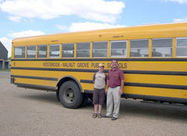
No More Pencils, No More Books: Rural schools say chronic underfunding is leading them to desperate measure
By Beth Walton
City Pages
Published: July 2, 2008
It wasn't until mid-June that state Rep. Mindy Greiling (DFL-Roseville) really understood the impact of underfunding state school districts. For years she has been lobbying for education reform, reworking numbers, charts, and data to bring more money to the districts. She knew that legislation would have to be written and the public would have to be convinced. It would take a complete overhaul of the state's education system. It would take a long time.
But after a June 16 committee meeting with administrators of the state's rural districts inBrainerd, the suburban congresswoman decided to put school reform on the fast track. "There were parents crying about what was happening at their schools," Greiling recalls. "People advocate for education a lot, but to have people actually in tears, we don't see that so often. It's obviously very dire times." ...Click here for the full article text.
By Beth Walton
City Pages
Published: July 2, 2008
It wasn't until mid-June that state Rep. Mindy Greiling (DFL-Roseville) really understood the impact of underfunding state school districts. For years she has been lobbying for education reform, reworking numbers, charts, and data to bring more money to the districts. She knew that legislation would have to be written and the public would have to be convinced. It would take a complete overhaul of the state's education system. It would take a long time.
But after a June 16 committee meeting with administrators of the state's rural districts inBrainerd, the suburban congresswoman decided to put school reform on the fast track. "There were parents crying about what was happening at their schools," Greiling recalls. "People advocate for education a lot, but to have people actually in tears, we don't see that so often. It's obviously very dire times." ...Click here for the full article text.

Pregnant Pause: Governor Tim Pawlenty may have vetoed the legislation, but that hasn't stopped women from being surrogates
By Beth Walton
City Pages
Published: June 18, 2008
Nestled away in Minnesota farm country, Mazeppa resident Stacey Suess sits on her back porch in a red plaid blouse and denim capris and recalls the heartbreak of infertility. After giving birth to her first son, Devin, doctors informed her that there were tumors in her uterus; her womb had to be removed.
The then-26-year-old had a house and two jobs and was trying to break free from an abusive marriage. "I really didn't have time to think about the fact that I wasn't going to have any more children," she says. "I had all this going on and suddenly, I had this baby to worry about."
Eight years later, much had changed in Suess's life. She had gotten divorced and taken a job in online research at the Mayo Clinic. She had fallen in love with a man named Gary, an agriculture specialist in Goodhue County, and made plans to remarry; she couldn't wait to start a family with him. ...Click here for the full article text.
By Beth Walton
City Pages
Published: June 18, 2008
Nestled away in Minnesota farm country, Mazeppa resident Stacey Suess sits on her back porch in a red plaid blouse and denim capris and recalls the heartbreak of infertility. After giving birth to her first son, Devin, doctors informed her that there were tumors in her uterus; her womb had to be removed.
The then-26-year-old had a house and two jobs and was trying to break free from an abusive marriage. "I really didn't have time to think about the fact that I wasn't going to have any more children," she says. "I had all this going on and suddenly, I had this baby to worry about."
Eight years later, much had changed in Suess's life. She had gotten divorced and taken a job in online research at the Mayo Clinic. She had fallen in love with a man named Gary, an agriculture specialist in Goodhue County, and made plans to remarry; she couldn't wait to start a family with him. ...Click here for the full article text.
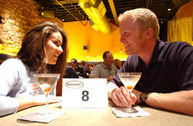
"So my boyfriend and I went speed dating..." Our intrepid reporter enters the modern world of attention deficit dates
By Beth Walton
City Pages
Published: June 18, 2008
Last Wednesday I called my boyfriend and asked if I could go speed dating. "It's for work," I pleaded. "I'm going to go undercover. PUH-leeeze."
"Um," he said.
"It will be fun. You can come too and pretend to be a photographer. There's free booze and sushi."
He took the bait. We had a date. ...Click here for the full article text.
By Beth Walton
City Pages
Published: June 18, 2008
Last Wednesday I called my boyfriend and asked if I could go speed dating. "It's for work," I pleaded. "I'm going to go undercover. PUH-leeeze."
"Um," he said.
"It will be fun. You can come too and pretend to be a photographer. There's free booze and sushi."
He took the bait. We had a date. ...Click here for the full article text.

Minnesota becomes second state to offer treatment to veterans who commit crimes: Legislators say it makes more sense to rehabilitate
By Beth Walton
City Pages
Published: May 21, 2008
Last week, Minnesota became the second state in the nation to pass a sentence-mitigation bill for veterans facing criminal prosecution who suffer from combat related mental health disorders. Gov. Tim Pawlenty signed the bill into law the evening of May 12, meaning courts will now be allowed to consider treatment over incarceration. California passed a similar law in 2007.
The legislation, tucked into the Reentry Omnibus Bill, requires the courts to inquire whether a defendant facing criminal proceedings is a veteran. By establishing military service, attorneys can then order a psychological evaluation. If a veteran is found to be suffering from a combat related mental illness such as post-traumatic stress disorder, the courts will work with the Department of Veterans Affairs so that treatment can be considered as part of the sentencing....Click here for the full article text.
By Beth Walton
City Pages
Published: May 21, 2008
Last week, Minnesota became the second state in the nation to pass a sentence-mitigation bill for veterans facing criminal prosecution who suffer from combat related mental health disorders. Gov. Tim Pawlenty signed the bill into law the evening of May 12, meaning courts will now be allowed to consider treatment over incarceration. California passed a similar law in 2007.
The legislation, tucked into the Reentry Omnibus Bill, requires the courts to inquire whether a defendant facing criminal proceedings is a veteran. By establishing military service, attorneys can then order a psychological evaluation. If a veteran is found to be suffering from a combat related mental illness such as post-traumatic stress disorder, the courts will work with the Department of Veterans Affairs so that treatment can be considered as part of the sentencing....Click here for the full article text.

Mystery illness fells young man: But to get her son's mysterious malady diagnosed, a mother must battle some of the area's top hospitals
By Beth Walton
City Pages
Published: May 14, 2008
School had just started for the year and Cole Haakana could hardly sit still in his fifth-grade classroom. Today, he was going to a friend's house and they were going to walk into town and get ice cream.
But when school let out later that day and the two boys walked the winding neighborhood roads that follow Lake Minnetonka's shoreline, Cole needed to stop and rest. The 10-year-old boy—who spent nearly all his free time riding his BMX bike, fishing, and playing baseball—suddenly felt weak.
He was wracked by a cough so scary that his friend's mother called Cole's mom.
Carrie Halvorson wasn't worried at first. It was September 2005, the kids were back in school, and Cole had probably just picked up some type of bug. They'd wait it out over the weekend. ...But when Monday came around and the cough had turned into a bark, Cole's father brought him to the doctor. The M.D. diagnosed him with "croup-like" symptoms and prescribed Prednisone, a steroid-based asthma medication. The next day, Cole awoke screaming, thinking his throat was closing. ...Click here for the full article text.
By Beth Walton
City Pages
Published: May 14, 2008
School had just started for the year and Cole Haakana could hardly sit still in his fifth-grade classroom. Today, he was going to a friend's house and they were going to walk into town and get ice cream.
But when school let out later that day and the two boys walked the winding neighborhood roads that follow Lake Minnetonka's shoreline, Cole needed to stop and rest. The 10-year-old boy—who spent nearly all his free time riding his BMX bike, fishing, and playing baseball—suddenly felt weak.
He was wracked by a cough so scary that his friend's mother called Cole's mom.
Carrie Halvorson wasn't worried at first. It was September 2005, the kids were back in school, and Cole had probably just picked up some type of bug. They'd wait it out over the weekend. ...But when Monday came around and the cough had turned into a bark, Cole's father brought him to the doctor. The M.D. diagnosed him with "croup-like" symptoms and prescribed Prednisone, a steroid-based asthma medication. The next day, Cole awoke screaming, thinking his throat was closing. ...Click here for the full article text.

Minnesota ranks second-lowest in the nation for total disciplinary actions against doctors: Senior advisor to WHO’s patient safety program: Frivolous lawsuits have created a high level of fear of litigation within the medical community
By Beth Walton
City Pages
Published: May 14, 2008
Last week the Wall Street Journal reported that Minnesota is one of the worst states when it comes to punishing doctors for malpractice. Using data from the Public Citizen Health Research Group, Minnesota ranks second to last, number 50 out of 51 state medical boards surveyed. (Washington, D.C., was included as a state in the study). There were 1.24 serious actions per 1,000 physicians in Minnesota between 2005 to 2007.
The rankings can mean two things, Jacob Goldstein reported in the paper’s health blog. Medical boards that are well funded and staffed tend to be more effective and tend to have more disciplinary actions, argues Sid Wolfe with the Public Citizen Health Research Group.
But the Federation of State Medical Boards sees it differently, arguing that the most effective medical boards are successful in preventing serious problems and therefore have low numbers of disciplinary actions. ...Click here for the full article text.
By Beth Walton
City Pages
Published: May 14, 2008
Last week the Wall Street Journal reported that Minnesota is one of the worst states when it comes to punishing doctors for malpractice. Using data from the Public Citizen Health Research Group, Minnesota ranks second to last, number 50 out of 51 state medical boards surveyed. (Washington, D.C., was included as a state in the study). There were 1.24 serious actions per 1,000 physicians in Minnesota between 2005 to 2007.
The rankings can mean two things, Jacob Goldstein reported in the paper’s health blog. Medical boards that are well funded and staffed tend to be more effective and tend to have more disciplinary actions, argues Sid Wolfe with the Public Citizen Health Research Group.
But the Federation of State Medical Boards sees it differently, arguing that the most effective medical boards are successful in preventing serious problems and therefore have low numbers of disciplinary actions. ...Click here for the full article text.

Madia tops Bonoff: Does our state contest mirror Clinton and Obama nationally?
By Beth Walton
City Pages
Published: April 16, 2008
An accomplished sitting female senator, a mother, well established in political circles, seemed a shoo-in. The money and endorsements were lined up. Nothing was going to keep her from taking on Washington, D.C. That was until a young, dark-skinned lawyer with an obscure, three-syllable name came along and captured the zeitgeist. The charming man, an unknown among political circles, flaunts his ability to mobilize grassroots voters, and has an uncanny ability to convince people that he's the one to bring about change.
Sound familiar?
Meet sitting state Sen. Terri Bonoff and Iraqwar veteran Ashwin Madia, Minnesota's very own version of Hillary and Barack. The race between Madia and Bonoff for the DFL endorsement for the Third District seat in the U.S. House of Representatives—vacated by retiring Republican Rep. Jim Ramstad—rings so familiar that even the editors at D.C.-based Roll Call wrote up the race 11 days before the April 12 convention.
But do Madia and Bonoff really mirror Obama and Hillary? Or are they being crammed into a convenient storyline based on superficial similarities? Ask Bonoff, the supposed Hillary in the race, what she thinks, and she's the first to say she's no Clinton. ...Click here for the full article text.
By Beth Walton
City Pages
Published: April 16, 2008
An accomplished sitting female senator, a mother, well established in political circles, seemed a shoo-in. The money and endorsements were lined up. Nothing was going to keep her from taking on Washington, D.C. That was until a young, dark-skinned lawyer with an obscure, three-syllable name came along and captured the zeitgeist. The charming man, an unknown among political circles, flaunts his ability to mobilize grassroots voters, and has an uncanny ability to convince people that he's the one to bring about change.
Sound familiar?
Meet sitting state Sen. Terri Bonoff and Iraqwar veteran Ashwin Madia, Minnesota's very own version of Hillary and Barack. The race between Madia and Bonoff for the DFL endorsement for the Third District seat in the U.S. House of Representatives—vacated by retiring Republican Rep. Jim Ramstad—rings so familiar that even the editors at D.C.-based Roll Call wrote up the race 11 days before the April 12 convention.
But do Madia and Bonoff really mirror Obama and Hillary? Or are they being crammed into a convenient storyline based on superficial similarities? Ask Bonoff, the supposed Hillary in the race, what she thinks, and she's the first to say she's no Clinton. ...Click here for the full article text.
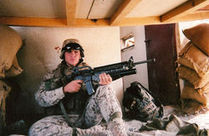
Soldier Suicides: veterans are killing themselves in record numbers, but at the VA, not much has changed
By Beth Walton
City Pages
Published: Mar. 26, 2008
On February 19, 2004, Private Jonathan Schulze's life changed forever. The stone-faced, blue-eyed Marine got word he was going to war in Iraq, an environment completely different from his previous cozy posts in Okinawa, Japan, and California.
Two months later, Schulze found himself in the midst of a bloody, two-day firefight in Ramadi. He watched a rocket-propelled grenade decapitate his best friend. There was no time to grieve, he told his family; he had to "bag and tag" bodies with the dead man's brains still smeared across his shirt. There were 16 U.S. fatalities that day.
Seven months later, after receiving a general discharge from the Marine Corps, Schulze returned to the family farm near Stewart, Minnesota, where he grew up. Although unusually quiet, his life seemed back on track; he worked construction with his father and fawned over his daughter, Kaley Marie.
In May 2005, Schulze suffered an on-the-job injury and turned to the Minneapolis Veterans Administration for treatment. For reasons unknown, his body was resisting antibiotics and he was continually developing infections.
But that wasn't all that was wrong. Jonathan told doctors that several times a day he experienced panic attacks. His heart would race, his chest would hurt, and he'd feel like he was being choked. He couldn't sleep at night and had developed a violent temper. One psychiatrist noted that Schulze said his "life was falling apart." ...Click here for the full article text.
By Beth Walton
City Pages
Published: Mar. 26, 2008
On February 19, 2004, Private Jonathan Schulze's life changed forever. The stone-faced, blue-eyed Marine got word he was going to war in Iraq, an environment completely different from his previous cozy posts in Okinawa, Japan, and California.
Two months later, Schulze found himself in the midst of a bloody, two-day firefight in Ramadi. He watched a rocket-propelled grenade decapitate his best friend. There was no time to grieve, he told his family; he had to "bag and tag" bodies with the dead man's brains still smeared across his shirt. There were 16 U.S. fatalities that day.
Seven months later, after receiving a general discharge from the Marine Corps, Schulze returned to the family farm near Stewart, Minnesota, where he grew up. Although unusually quiet, his life seemed back on track; he worked construction with his father and fawned over his daughter, Kaley Marie.
In May 2005, Schulze suffered an on-the-job injury and turned to the Minneapolis Veterans Administration for treatment. For reasons unknown, his body was resisting antibiotics and he was continually developing infections.
But that wasn't all that was wrong. Jonathan told doctors that several times a day he experienced panic attacks. His heart would race, his chest would hurt, and he'd feel like he was being choked. He couldn't sleep at night and had developed a violent temper. One psychiatrist noted that Schulze said his "life was falling apart." ...Click here for the full article text.

Crime and PTSD: Pending legislation would help veterans get treatment instead of prison time
By Beth Walton
City Pages
Published: Mar. 26, 2008
In 2000, four years after graduating high school in Shoreview, Tony Klecker enlisted in the United States Marine Corps as an engineer. After 9/11, his unit was put on high alert. Soon enough, Klecker found himself on tours throughout Kuwait, Afghanistan, and Iraq.
Deployed to Iraq in 2003 during the invasion, Klecker fired on a civilian vehicle that didn't slow down as it approached a checkpoint. Unsure if anyone died, Klecker was haunted by the incident, even after he came back. Klecker also remembers the time when a massive sandstorm brought the entire invasion to a standstill. In the midst of battle, soldiers could see no more than a few feet in front of them. Once the storm lifted, he was horrified by the carnage around him.
After finishig his six-month stint in combat, Klecker completed his tour in Japan, where he began to self-medicate. He drank heavily, with the purpose of passing out to block nightmares. The drinking intensified when Klecker came home. ...In September 2006, Klecker sought help for his alcoholism from the VA, but was told he'd have to wait several weeks to begin treatment, his lawyer, Brockton Hunter, says. The next month, he was drunk behind the wheel when he caused a multi-car collision on Highway 494 in South St. Paul. The accident killed a 16-year-old girl. ...Click here for the full article text.
By Beth Walton
City Pages
Published: Mar. 26, 2008
In 2000, four years after graduating high school in Shoreview, Tony Klecker enlisted in the United States Marine Corps as an engineer. After 9/11, his unit was put on high alert. Soon enough, Klecker found himself on tours throughout Kuwait, Afghanistan, and Iraq.
Deployed to Iraq in 2003 during the invasion, Klecker fired on a civilian vehicle that didn't slow down as it approached a checkpoint. Unsure if anyone died, Klecker was haunted by the incident, even after he came back. Klecker also remembers the time when a massive sandstorm brought the entire invasion to a standstill. In the midst of battle, soldiers could see no more than a few feet in front of them. Once the storm lifted, he was horrified by the carnage around him.
After finishig his six-month stint in combat, Klecker completed his tour in Japan, where he began to self-medicate. He drank heavily, with the purpose of passing out to block nightmares. The drinking intensified when Klecker came home. ...In September 2006, Klecker sought help for his alcoholism from the VA, but was told he'd have to wait several weeks to begin treatment, his lawyer, Brockton Hunter, says. The next month, he was drunk behind the wheel when he caused a multi-car collision on Highway 494 in South St. Paul. The accident killed a 16-year-old girl. ...Click here for the full article text.

Artist takes on destructive plants: Jim Proctor's art isn't just engaging, it could save forests
By Beth Walton
City Pages
Published: Mar. 26, 2008
In the semester before his college graduation in 1992, St. Olaf art major Jim Proctor wasn't sure what role art would play in his adult life. He had started losing interest in his landscape paintings and was confused about where his imagination would take him next.
Obsessed with depicting nature in his work, Proctor gathered roots, plants, and branches and brought them into his studio for inspiration. One day, a piece of earth found its way onto the canvas.
"It was a whole eureka moment, I guess, where I realized that these things could be art themselves," Proctor explains in his cozy south Minneapolis apartment and studio, which is brimming with plants and books. "Rather than representing it, I realized I could work with it." ...Click here for the full article text.
By Beth Walton
City Pages
Published: Mar. 26, 2008
In the semester before his college graduation in 1992, St. Olaf art major Jim Proctor wasn't sure what role art would play in his adult life. He had started losing interest in his landscape paintings and was confused about where his imagination would take him next.
Obsessed with depicting nature in his work, Proctor gathered roots, plants, and branches and brought them into his studio for inspiration. One day, a piece of earth found its way onto the canvas.
"It was a whole eureka moment, I guess, where I realized that these things could be art themselves," Proctor explains in his cozy south Minneapolis apartment and studio, which is brimming with plants and books. "Rather than representing it, I realized I could work with it." ...Click here for the full article text.

A Soldier in Winter: A 24-year-old veteran seeks redemption for atrocities committed during the Iraq war
By Beth Walton
City Pages
Published: Mar. 5, 2008
Sipping on a longneck Miller Genuine Draft, Jen's brown eyes glaze over as she stares out the window of an Uptown bar, blocks away from the Veterans for Peace Building where she just finished volunteering. Jen, who does not want her last name used for fear of legal action, is nervously contemplating the day a few years back when, as a guard for a U.S. enemy prisoner of war camp in Iraq, she purposely poisoned two detainees.
"It didn't truly dawn on me until pretty recently that those guys probably died and it's my fault," says Jen, who moved to St. Paul from Racine, Wisconsin, in January.
The small, 125-pound brunette says she broke open the flameless heater from her Army Meals Ready to Eat packet and spliced its magnesium, iron, and salt-based contents into a cigarette, offering the toxic treat to the unwitting prisoners. "I didn't feel bad at the time because they weren't humans," she says. "To me they were animals. That's how the military works, that's how the military trains people to get stuff done. They desensitize human emotions." ...Click here for the full article text.
By Beth Walton
City Pages
Published: Mar. 5, 2008
Sipping on a longneck Miller Genuine Draft, Jen's brown eyes glaze over as she stares out the window of an Uptown bar, blocks away from the Veterans for Peace Building where she just finished volunteering. Jen, who does not want her last name used for fear of legal action, is nervously contemplating the day a few years back when, as a guard for a U.S. enemy prisoner of war camp in Iraq, she purposely poisoned two detainees.
"It didn't truly dawn on me until pretty recently that those guys probably died and it's my fault," says Jen, who moved to St. Paul from Racine, Wisconsin, in January.
The small, 125-pound brunette says she broke open the flameless heater from her Army Meals Ready to Eat packet and spliced its magnesium, iron, and salt-based contents into a cigarette, offering the toxic treat to the unwitting prisoners. "I didn't feel bad at the time because they weren't humans," she says. "To me they were animals. That's how the military works, that's how the military trains people to get stuff done. They desensitize human emotions." ...Click here for the full article text.

Kinky Sex Makes College Go 'Round: U of M sex club students defend themselves from conservative scorn
By Beth Walton
City Pages
Published: Feb. 6, 2008
Mike Lent hugs everyone who walks though the door of the Queer Student Cultural Center, a grape-and-lime painted office tucked away on the second floor of the University of Minnesota's Coffman Memorial Union.
"Welcome to Kinky U," Lent says eagerly, tucking strands of his blond highlighted hair behind his ear. "We're playing 'Don't Break the Ice,' you know, to break the ice."
It's the last night of January, and Kinky U's first meeting since being lambasted by Star Tribune columnist Katherine Kersten, who portrayed the student group as a latter-day Sodom and Gomorrah. Bryan, age 25 and the group's comedian, jokes about "rocking someone's cock off." Someone else makes small talk about the weather. ...Click here for the full article text.
By Beth Walton
City Pages
Published: Feb. 6, 2008
Mike Lent hugs everyone who walks though the door of the Queer Student Cultural Center, a grape-and-lime painted office tucked away on the second floor of the University of Minnesota's Coffman Memorial Union.
"Welcome to Kinky U," Lent says eagerly, tucking strands of his blond highlighted hair behind his ear. "We're playing 'Don't Break the Ice,' you know, to break the ice."
It's the last night of January, and Kinky U's first meeting since being lambasted by Star Tribune columnist Katherine Kersten, who portrayed the student group as a latter-day Sodom and Gomorrah. Bryan, age 25 and the group's comedian, jokes about "rocking someone's cock off." Someone else makes small talk about the weather. ...Click here for the full article text.
Proudly powered by Weebly